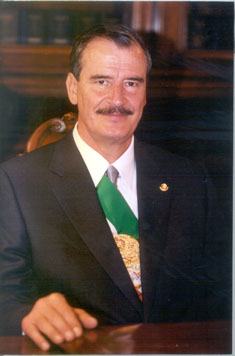Feature:
Mexico
Moves
to
Decriminalize
Drug
Possession
--
No,
Wait,
Nevermind
5/5/06
Lame-duck Mexican President Vicente Fox abruptly changed course Wednesday, sending back to the congress a drug decriminalization bill that only the day before his spokesman said he would sign. The move against the bill passed by the Mexican Senate last Friday came after heavy pressure from the United States, including a Monday ambassadorial meeting in Washington and a Wednesday statement from the US Embassy in Mexico City urging the Mexicans to rethink the bill.
And this week, even though a spokesman for President Fox reaffirmed Tuesday that Fox would sign the bill, its fate was settled Wednesday afternoon amid concern and outrage not only from north of the border, but also from law enforcement and political figures inside Mexico. By mid-week, prominent Mexican politicians were already talking about revising the law to restrict the bill's decriminalization provisions to apply to addicts only and the US government had made a rare public announcement about a domestic Mexican political matter. The quantities adapted by the Mexican congress as constituting personal use amounts were generally, but not always, reasonable approximations of single-use or single-session amounts. Under the bill as passed by the congress, possession of up to five grams of marijuana, 25 milligrams of heroin, a half-gram of cocaine, two-tenths of a gram of methamphetamine or Ecstasy, and one-quarter gram of psychedelic mushrooms would be considered possession for personal use. And in a nod to Mexico's indigenous population, the measure would also decriminalize the possession of up to 2.2 pounds of psychedelic peyote cactus. Despite the ambiguities and potential pitfalls, the passage of the law was greeted with cheers by Latin American jurists in Vancouver for the annual conference of the International Harm Reduction Association. "I of course support the decriminalization in Mexico," said former Colombian Attorney General Gustavo de Greiff, now head of that Latin American anti-prohibitionist umbrella group, REFORMA. "But legalization is better. Decriminalization is good for consumers, but it allows the drug traffickers and the corrupt to keep enriching themselves. The only way to destroy the business of the narcos and the corrupt is legalization," de Greiff said. "Let us not forget that before he was elected, Fox said we need to discuss alternatives to prohibition," de Greiff, who currently resides in Mexico City and who formerly served as Colombia's ambassador to Mexico, added. "I hope he does not veto this bill." By Wednesday evening, however, de Greiff's hope had turned to dismay. "This refusal by Fox to sign the bill is an act of political cowardice," he fumed. "This is an advance, but a qualified one," said Brazilian jurist Maria Lucia Karam, discussing the bill before Fox announced he had killed it. "As a matter of judicial philosophy, the law tries to say that the act of possession remains illicit, but drug addicts and users are excluded from being held responsible, as if they were not free to choose, but drug possession should not be an illicit act because it is a private behavior that doesn't affect any rights or interests of others," she told DRCNet. "Even if the practical result is a good one, the legal philosophy behind it is bad." Karam also criticized the bill for its lack of retroactivity and for its necessarily arbitrary setting of personal use quantities. "How do you say that 5 grams is okay, but 10 grams isn't? If you can buy a bottle of whiskey or a case of whiskey, you should be able to do the same with other drugs, especially if it's for your personal use," said the retired Rio de Janeiro judge.
Confronted by internecine warfare between drug trafficking organizations that has left 1500 dead in the past year -- and was undoubtedly exacerbated by the Mexican government's latest effort to crack down on the "cartels" -- as well as by rising domestic drug use levels, the Fox government is under increasing pressure to do something about the drug problem. Within the last two weeks, four undercover drug agents were gunned down in Nuevo Laredo and two police officers were beheaded by drug traffickers in Acapulco. The country is also faced with growing drug use and a thriving trade to supply it, according to Mexican researchers. This bill would have freed up criminal justice system resources currently devoted to dealing with drug users. It also would have given the government more ammunition in the form of stiffer sentences for drug trafficking and sales offenses and it would give it more boots on the ground in the drug war in the form of 400,000 state and municipal police officers who would now be allowed to take part in drug law enforcement. Under current law, only Mexico's roughly 100,000 federal police agents can enforce the drug laws. Lost in much of the initial US coverage of the bill was the awareness that under existing Mexican drug law, people caught with drugs can already seek an exemption from punishment by claiming they are addicts. But that provision of existing law was arbitrary -- there was no definition of what constituted an amount for an addict's personal use -- and rife with possibilities for corruption and abuse of the legal system. The new law would have been an advance for drug users because it extends the exemption from prosecution of addicts to "consumers." In other words, one would no longer have to argue that he is an addict in order to try to escape punishment. Instead, a person caught in possession of less than the specified amounts could simply claim that he is a consumer carrying drugs for his own personal consumption. Despite the hyperventilating fears of some US politicians, Amsterdam-style cannabis cafes were not about to appear on the beaches of Cancun or in Boys' Town in Nuevo Laredo, given that there is no provision for the legal, regulated sale of illicit drugs. In the face of criticism this week, some Mexican politicians argued that people possessing small quantities of drugs will still be subject to police harassment and arrest and will have to appear before a judge to be released. By late Tuesday, there were signs the Fox government was backtracking. Mexican Minister of Public Safety, the nation's "top cop," Eduardo Medina Mora, told the AP that the bill would have to be "analyzed" and "reconsidered" because legislators had gone beyond Fox's vision by laying out quantities to define personal use. He also warned that Mexican cities can -- and some already do -- enact municipal ordinances criminalizing drug possession and foreigners caught using or possessing drugs could be thrown out of the country, although they would not be formally deported or banned from returning. Unfortunately for the US government, Medina Mora conceded that while some offenders could be recommended for treatment, such programs are not mandatory. Still, attempting to damp down US nightmare visions of legions of college students adding heroin or cocaine to their alcoholic spring break vacations, Medina Mora warned that Mexico would not be friendly to drug tourism. He said that "Mexico is not, has not been and will not become a refuge for those who wish to come to our country to use drugs indiscriminately," he said. That's not quite how it sounded last Friday, when the Senate passed the bill. "The object of this law is to not put consumers in jail, but rather those who sell and poison," said Sen. Jorge Zermeno of the ruling National Action Party. "The government believes that this law represents progress, because it established the minimum quantities that a citizen can carry for personal use. The president is going to sign this law," said Aguilar, calling the legislation "a better tool... that allows better action and better coordination in the fight against drug dealing." But the Americans were not assuaged by the Mexico's explanations of the law's nuances or the public safety minister's tip-toeing around the issue. After a low-key initial reaction from the State Department, Foggy Bottom stepped up. "US officials urged Mexican representatives to review the legislation urgently, to avoid the perception that drug use would be tolerated in Mexico, and to prevent drug tourism," US Embassy spokeswoman Judith Bryan said in a statement Wednesday. The US government wants Mexico "to ensure that all persons found in possession of any quantity of illegal drugs be prosecuted or be sent into mandatory drug treatment programs." The official US position appeared positively restrained when contrasted to the reactions of some border area politicians. "I'm appalled. I'm in a state of disbelief," said San Diego Mayor Jerry Sanders, whose city is just across the border from Tijuana. "I certainly think we are going to see more drugs available in the United States," Sanders told the Associated Press. "We need to register every protest the American government can muster." Mexican and other observers reacted a little more calmly to the bill as passed by the Congress. "This bill is the second of two drug law reform proposals Fox sent to the legislature in 2004, and both parts are designed to reinforce the fight against the retail drug traffic" explained Ricardo Sala of the Mexican drug reform organization Vive Con Drogas. "The first part was passed last summer and allows law enforcement and the judicial system at the state and municipal level into the fight. Before that, under Mexican law, drug trafficking was a federal crime, to be prosecuted only by federal officers," he told DRCNet. The second act was the bill passed by the Mexican Senate last week. According to Sala, it was earlier actions by two committees in the lower chamber, which passed the bill earlier, that amended the Fox government's original proposal to include the language saying that criminalization does not apply to addicts or consumers, or to religious or medicinal use. "This was curious because Fox's original proposal was quite the opposite: to allow the criminalization of the consumer," said Sala, noting that since 1994 Mexican law allowed for addicts to escape punishment for the possession of personal use amounts. "Fox's original proposal was to eliminate that language," he said. "While the first headlines in the US press took a very simple line that Mexico was going to decriminalize small amounts of drugs, it appears that this bill was basically designed to change law enforcement priorities so Mexico can focus on the people who sell and traffic in drugs," said Margaret Dooley of the Drug Policy Alliance's Southern California office. "It wasn't legalization, and it may not even have been decrim, given that Mexican officials were saying this week if you get caught, you still have to go through the criminal justice system. At this point, it is still unclear what this all means," she said Wednesday. While decriminalization would have been a step forward for Mexican drug users, it would have been unlikely to reduce the bloody violence, crime, and social disorder associated with the black market drug trade. "This will have no impact on the negative effects of the illicit drug trade," said Judge Karam, acknowledging the obvious. But now that point is moot, at least for the foreseeable future. It is unclear whether the Mexican legislature will act quickly to revise the bill, and with national elections in July, it will be a whole new legislature and government that will probably address this unfinished business.
|


